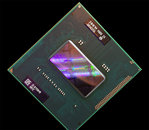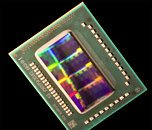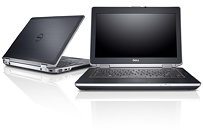Tuesday, March 8th 2011

Intel Announces Second-Generation Core vPro Family of Processors
Bringing industry leading security and manageability, and better, more flexible performance to business computing, Intel Corporation today unveiled its newest family of business processors. The new 2nd generation Intel Core vPro processor family features the performance and capabilities of Intel's new microarchitecture, enhancements to Intel vPro technology and new security features, including a 3G "poison pill" option to help protect a PC's data.
Computer makers around the world, including Dell, Fujitsu, HP and Lenovo, are introducing new laptop, convertible-tablet, desktop and all-in-one PCs for businesses based on the new Intel Core vPro processors."Businesses face numerous challenges today, but also opportunities in the wealth of new technologies that are helping workers be more productive, businesses to be more creative and IT to be more innovative," said Rick Echevarria, vice president, Intel Architecture Group, and general manager, Business Client Platform Division. "Providing the right combination of technologies at the right time, the new Intel Core vPro processor family continues Intel's advancement in performance, security and management. Possibly more critical, it readies businesses for major changes to come in such areas as desktop virtualization, cloud computing and the complementary relationship between PCs and the growing variety of other computing devices."
Performance Matters
To take full advantage of emerging innovation, the new Core vPro processors offer the increased performance of Intel's new microarchitecture, enhanced Intel Turbo Boost Technology 2.0 and new Intel Advanced Vector Extensions (AVX). Compared to a 3-year-old Intel Core 2 Duo processor, a new Intel Core vPro i5 processor speeds up business applications by 60 percent, multitasking by 100 percent and data encryption by 300 percent.
"This kind performance equates to enormous promise for the PC, for example, as the 'hub' for the varied combination of tablets, smart phones, netbooks and operating systems filling our pockets and briefcases," said Echevarria. "The new Core vPro processor family has the capacity to offload tasks or even better share them to get the most from companion devices. With such performance, the PC could be a service provider, coordinating encryption, virus scanning, near transparent syncs and remote control."
Protecting Data on Missing Laptops
To provide stronger defense against the problem of laptop theft and data loss, Intel today introduced Intel Anti-Theft Technology Ver. 3.0 (AT 3.0), included on all 2nd generation Intel Core and Core vPro processors.
Previous versions of Intel Anti-Theft Technology enabled authorized IT or service personnel to send a coded "poison pill" over the Internet to completely disable a lost or stolen computer and help prevent access to its encrypted data and deter theft. New Intel AT 3.0 enables the poison pill to be sent as an encrypted, authenticated SMS message by an authorized administrator over a 3G cellular network as well within moments after a missing laptop is turned on. When recovered, the PC can be similarly re-activated with another message. Its new Locator Beacon capability gives authorities the ability to pinpoint a missing laptop using GPS technology on select 3G modems.
Finally, the new Intel AT 3.0 standby protection feature helps protect encrypted PCs that go missing in the vulnerable standby state (S3). When awakened, the new standby protection feature can change normal procedure to require an encryption login, which is much more secure than the usual username and password.
Drying Up the Ol' Phishing Hole
New Intel Identity Protection Technology (IPT), which is integrated into select 2nd generation Intel Core and Core vPro processors, helps stymie phishing attacks aimed at gaining unlawful access to corporate, e-banking, e-commerce and other secure sites. IPT supplements normal password procedures by generating a new six-digit numerical password every 30 seconds to help ensure only authorized access.
Symantec and VASCO are the first to use this technology to provide easy-to-use, secure communications between PCs, and businesses and e-commerce sites.
Making IT Simpler
The 2nd generation Intel Core vPro processors also help make IT simpler with the new Host-Based Configuration feature that completely automates the process of setting up the vPro functions on new computers. Now even thousands of computers can be configured simultaneously in a couple of minutes.
Intel's Keyboard-Video-Mouse (KVM) Remote Control feature now enables a remote technician to see the worker's screen presentation in higher resolutions to accommodate HD video and screen sizes.
Visually Smart Performance for the New Office
When a workload requires extra performance, the enhanced Intel Turbo Boost Technology 2.0 steps up processor speeds beyond their rated frequency by analyzing temperature and power consumption. New Intel AVX improves the performance of computing-intensive applications, such as image manipulation, audio/video processing, scientific simulations, financial analytics, and 3-D modeling and analysis.
To meet the growing dominance of video as the potential heir to traditional white papers, product briefs and slide presentations, the new processor family integrates Intel HD Graphics and advanced media processing into its entire line, eliminating the need for separate graphical processing units for performance-intensive graphical applications.
Also the Intel Quick Sync Video feature doubles the speed of creating DVDs or Blu-ray discs, editing and converting video files into other formats over the preceding generation of Intel Core vPro processors.
Intel vPro Technology Expands Into New Realms
The soon-to-be-released Intel Xeon processor E3-1200 product family will bring all of the advances of Intel's new microarchitecture to entry-level workstations. It is the first entry-level workstation platform to integrate professional-level graphics onto the processor, enabling visual and 3-D graphics capabilities previously only available with separate graphics cards. Intel is also extending support for Intel vPro technology to these workstations.
In addition to workstations and servers, Intel vPro Technology also can be found in a variety of innovative applications beyond PCs, such as retail, digital signage and banking devices. With features such as Intel Active Management Technology 7.0 built-in, 2nd generation Intel Core vPro i5 and i7, and Intel Xeon E3 processors, embedded customers are able to manage multiple devices from a single host station, which enables them to troubleshoot problems real-time and effectively lower costs for manual checks.
Computer makers around the world, including Dell, Fujitsu, HP and Lenovo, are introducing new laptop, convertible-tablet, desktop and all-in-one PCs for businesses based on the new Intel Core vPro processors."Businesses face numerous challenges today, but also opportunities in the wealth of new technologies that are helping workers be more productive, businesses to be more creative and IT to be more innovative," said Rick Echevarria, vice president, Intel Architecture Group, and general manager, Business Client Platform Division. "Providing the right combination of technologies at the right time, the new Intel Core vPro processor family continues Intel's advancement in performance, security and management. Possibly more critical, it readies businesses for major changes to come in such areas as desktop virtualization, cloud computing and the complementary relationship between PCs and the growing variety of other computing devices."
Performance Matters
To take full advantage of emerging innovation, the new Core vPro processors offer the increased performance of Intel's new microarchitecture, enhanced Intel Turbo Boost Technology 2.0 and new Intel Advanced Vector Extensions (AVX). Compared to a 3-year-old Intel Core 2 Duo processor, a new Intel Core vPro i5 processor speeds up business applications by 60 percent, multitasking by 100 percent and data encryption by 300 percent.
"This kind performance equates to enormous promise for the PC, for example, as the 'hub' for the varied combination of tablets, smart phones, netbooks and operating systems filling our pockets and briefcases," said Echevarria. "The new Core vPro processor family has the capacity to offload tasks or even better share them to get the most from companion devices. With such performance, the PC could be a service provider, coordinating encryption, virus scanning, near transparent syncs and remote control."
Protecting Data on Missing Laptops
To provide stronger defense against the problem of laptop theft and data loss, Intel today introduced Intel Anti-Theft Technology Ver. 3.0 (AT 3.0), included on all 2nd generation Intel Core and Core vPro processors.
Previous versions of Intel Anti-Theft Technology enabled authorized IT or service personnel to send a coded "poison pill" over the Internet to completely disable a lost or stolen computer and help prevent access to its encrypted data and deter theft. New Intel AT 3.0 enables the poison pill to be sent as an encrypted, authenticated SMS message by an authorized administrator over a 3G cellular network as well within moments after a missing laptop is turned on. When recovered, the PC can be similarly re-activated with another message. Its new Locator Beacon capability gives authorities the ability to pinpoint a missing laptop using GPS technology on select 3G modems.
Finally, the new Intel AT 3.0 standby protection feature helps protect encrypted PCs that go missing in the vulnerable standby state (S3). When awakened, the new standby protection feature can change normal procedure to require an encryption login, which is much more secure than the usual username and password.
Drying Up the Ol' Phishing Hole
New Intel Identity Protection Technology (IPT), which is integrated into select 2nd generation Intel Core and Core vPro processors, helps stymie phishing attacks aimed at gaining unlawful access to corporate, e-banking, e-commerce and other secure sites. IPT supplements normal password procedures by generating a new six-digit numerical password every 30 seconds to help ensure only authorized access.
Symantec and VASCO are the first to use this technology to provide easy-to-use, secure communications between PCs, and businesses and e-commerce sites.
Making IT Simpler
The 2nd generation Intel Core vPro processors also help make IT simpler with the new Host-Based Configuration feature that completely automates the process of setting up the vPro functions on new computers. Now even thousands of computers can be configured simultaneously in a couple of minutes.
Intel's Keyboard-Video-Mouse (KVM) Remote Control feature now enables a remote technician to see the worker's screen presentation in higher resolutions to accommodate HD video and screen sizes.
Visually Smart Performance for the New Office
When a workload requires extra performance, the enhanced Intel Turbo Boost Technology 2.0 steps up processor speeds beyond their rated frequency by analyzing temperature and power consumption. New Intel AVX improves the performance of computing-intensive applications, such as image manipulation, audio/video processing, scientific simulations, financial analytics, and 3-D modeling and analysis.
To meet the growing dominance of video as the potential heir to traditional white papers, product briefs and slide presentations, the new processor family integrates Intel HD Graphics and advanced media processing into its entire line, eliminating the need for separate graphical processing units for performance-intensive graphical applications.
Also the Intel Quick Sync Video feature doubles the speed of creating DVDs or Blu-ray discs, editing and converting video files into other formats over the preceding generation of Intel Core vPro processors.
Intel vPro Technology Expands Into New Realms
The soon-to-be-released Intel Xeon processor E3-1200 product family will bring all of the advances of Intel's new microarchitecture to entry-level workstations. It is the first entry-level workstation platform to integrate professional-level graphics onto the processor, enabling visual and 3-D graphics capabilities previously only available with separate graphics cards. Intel is also extending support for Intel vPro technology to these workstations.
In addition to workstations and servers, Intel vPro Technology also can be found in a variety of innovative applications beyond PCs, such as retail, digital signage and banking devices. With features such as Intel Active Management Technology 7.0 built-in, 2nd generation Intel Core vPro i5 and i7, and Intel Xeon E3 processors, embedded customers are able to manage multiple devices from a single host station, which enables them to troubleshoot problems real-time and effectively lower costs for manual checks.




11 Comments on Intel Announces Second-Generation Core vPro Family of Processors
take the red pill, and you find out your laptop commited suicide.
of course the poison pill is entirely worthless, if you just disable the 3G/replace the sim card in it.
they said its sent via SMS message to the 3G module on the laptop.
You disable the 3G card, format the OS (for any killswitch software installed there) and you're good to go. its a worthless tech.
It stops the computer from booting. with disk encryption this is pretty secure. And of course the 3G radio card won't be THAT easy to remove.
would you buy a laptop, if you couldnt change the 3G provider at a later date?
It's also only one of the ways that triggers the so-called "poison pill".